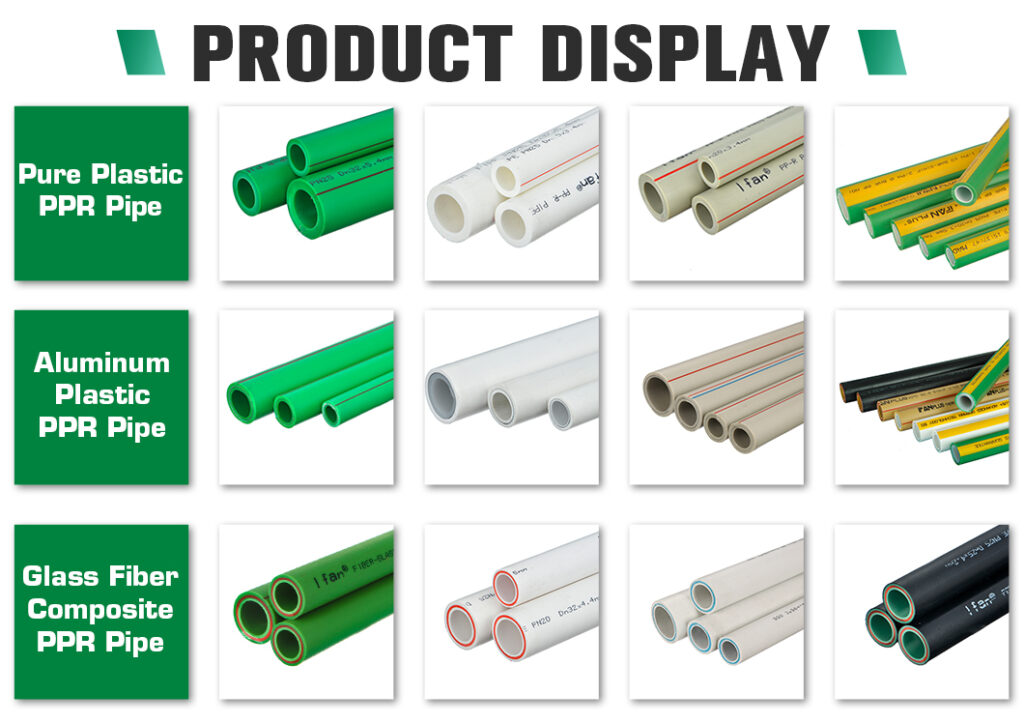The Versatility of PPR Pipes in Industrial Applications,Polypropylene Random Copolymer (PPR) pipes are gaining widespread acclaim in various industrial applications due to their unique set of properties. In this article, we will delve into the fundamentals of PPR pipes, their applications in different industries, and the advantages that set them apart.IFAN factory 30+ years manufacture experience support color/size customization support free sample.Welcome to consult for catalog and free samples.This is our FacebookWebsite: www.facebook.com.
Introduction to PPR Pipes
PPR pipes are a type of thermoplastic piping system that has emerged as a popular choice for fluid and gas transport in various industrial domains. They are constructed from a versatile material called Polypropylene Random Copolymer (PPR), known for its outstanding mechanical, thermal, and chemical properties.
The Industrial Applications of PPR Pipes
PPR pipes find extensive utility across an array of industries due to their exceptional characteristics:
1. Plumbing and Construction Industry
PPR pipes are predominantly used in the plumbing and construction sector. They are employed for both residential and commercial buildings, ensuring a safe and reliable water supply. PPR pipes are ideal for this application due to their resistance to scale buildup, corrosion, and heat.

2. Chemical Industry
In the chemical industry, the transportation of various chemicals demands robust and corrosion-resistant piping systems. PPR pipes meet these requirements and are widely used for the safe and efficient conveyance of chemicals.
3. Agriculture and Irrigation
Agriculture relies heavily on efficient irrigation systems. PPR pipes are valued for their resistance to chemical fertilizers and durability, making them suitable for irrigation systems in agriculture.
4. Pharmaceutical Industry
The pharmaceutical sector requires precise and uncontaminated systems for the production of medications. PPR pipes are employed to transport purified water, fluids, and various pharmaceutical ingredients due to their hygienic properties.
5. Food Processing and Beverage Industry
In the food and beverage industry, PPR pipes are used for hygienic water supply and fluid transfer. Their resistance to scaling and bacterial growth makes them an ideal choice for maintaining high standards of food safety.
6. Cooling Systems
PPR pipes are employed in cooling systems, particularly in industrial settings where maintaining stable temperatures is crucial. Their resistance to heat and corrosion makes them an efficient choice for this application.
The Advantages of PPR Pipes
PPR pipes offer several key advantages:
1. Corrosion Resistance: They are highly resistant to corrosion, ensuring the integrity of the piping system even when conveying aggressive substances.
2. High Temperature Tolerance: PPR pipes can withstand a wide temperature range, making them suitable for both hot and cold applications.
3. Longevity: These pipes have a long service life and require minimal maintenance, contributing to cost-efficiency.
4. Chemical Resistance: They are compatible with a wide range of chemicals, enhancing their versatility in various industrial settings.
5. Easy Installation: The lightweight and easy-to-handle nature of PPR pipes simplifies installation procedures, reducing labor costs.
Considerations in Using PPR Pipes
When using PPR pipes in industrial applications, consider the following:
1. Sizing and Pressure Requirements: Select the appropriate pipe size to meet the required flow rate and pressure conditions within the system.
2. Compatibility: Ensure that PPR pipes are compatible with other materials used in the system, including fittings, valves, and connectors.
3. Routine Maintenance: Regular inspections and maintenance are essential for sustaining the optimal performance of the piping system.
4. Environmental Impact: Recognize that PPR pipes are recyclable and have a low environmental impact compared to other piping materials, contributing to sustainability.
In conclusion, PPR pipes have established themselves as a versatile and practical solution for fluid and gas transport in various industrial applications. Their resistance to corrosion, wide temperature range, and ease of installation make them a preferred choice in sectors as diverse as construction, agriculture, chemicals, and more. Understanding the strengths of PPR pipes and their correct application is crucial in ensuring efficient and reliable industrial processes.

